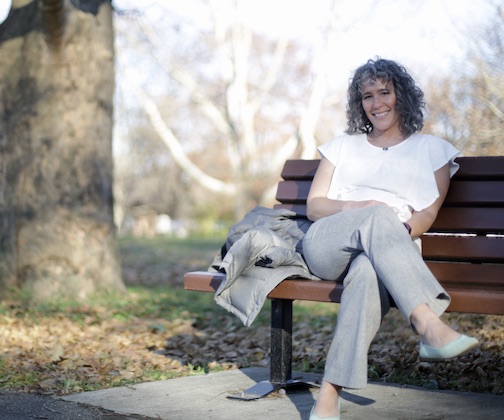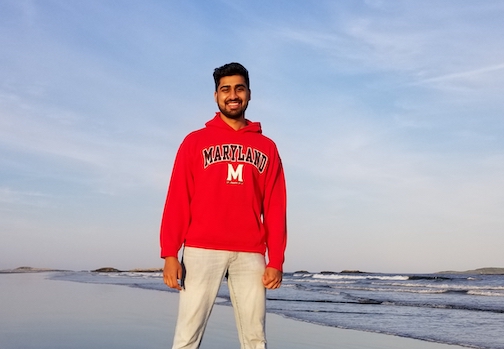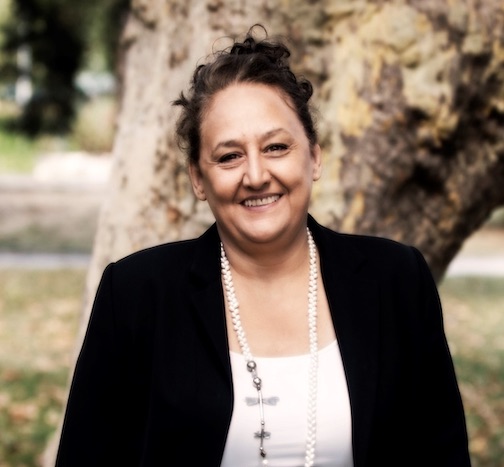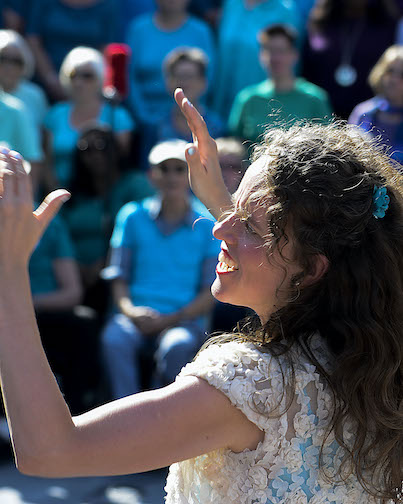Tell us about your background and what got you interested in being a singer and musical facilitator of health-based communities and groups.
I had my first experiences of the power of the voice whilst singing in churches and at the age of 15, felt a strong calling to use my voice as a tool of transformation for others and myself. I was fortunate to be born into a musical family, with plenty of singing round the piano. My grandmother was deaf and my Grandfather was a hearing child of deaf parents who became a Pastor for the deaf, directing signed plays and choirs. So I grew up surrounded by people who talked – and sang - on their hands and see conducting as a direct legacy of this.
These early experiences of different forms of voice embedded a commitment to work inclusively and sensitively with the vast diversity of needs and abilities in community. I started working with children with special needs in my teens and later ran a holistic therapy practice adults in residential care. I repeatedly witnessed the power of touch and music to connect and communicate with those who could not access conventional forms of voice and expression.
Having immersed myself in the arts and holistic therapies. I began working with individuals in 2000 and leading singing groups in 2002. With my love of vocal harmony, it was a natural progression to start leading community choirs with people of diverse backgrounds in settings including hospitals, hospices and carers centres. This now includes co-directing, Sing for Water, a mass choral fundraising event for WaterAid which embodies my deeply held conviction that singing is transformational – for both the singer and the wider world.
Tell us about your innovative approach towards working with hospitals, chronic illness, and loneliness, and the different neighborhoods and locations where you've developed a musical foundation around social, emotional and physical health.
My experience is that singing can bring enormous benefits to those experiencing challenging circumstances. These include:
- Physical – singing is a form of gentle cardio-vascular exercise with well-researched health benefits. The deeper, fuller breaths required for singing, have regulating effects on our whole body, including our heart rate and brain waves.
- Mental – learning lyrics and melodies is great brain gym and brings us into the present moment, alleviating worries.
- Emotional – a great mood booster and cathartic expression, singing releases stress-busting happy hormones and endorphins.
- Spiritual – singing brings respite from daily life, bringing a sense of transcendence as we use our imagination, creativity and intuition to create something beautiful together.
- Social – singing boosts self-confidence, communication and connectivity - choirs quickly become supportive eco-systems of friendships.
- Contribution – through fundraisers and performances choirs can support and bring joy to our local and global community.
I have seen people literally walk into a room stooped over and leave standing tall, breathing deep and smiling, having built friendships and resilience to help them cope with challenging circumstances. I continue to be amazed by the magic that becomes available when we reclaim the power of our voices.
How has your routine changed since the pandemic?
The majority of my work was in person on my feet in community before the pandemic. Within two weeks everything was cancelled and I moved as much as I could online. Despite the technical challenges, singing online has been a lifeline of connection, especially for more vulnerable groups. Whilst much of my work continues online, I now have two groups meeting in person following Covid guidelines.
As working on screen is completely unnatural to me, I’ve had to step up my self-care routines to include yoga, running and walking and I’ve been busy incubating creative projects which I look forward to releasing soon!
How does trust play a role in your daily routine, especially with hospice work, and with patients in hospital in the current Covid-19 atmosphere?
When working in community arts groups, it is essential to hold an inclusive, welcoming space where everyone’s voices can be heard. We are all jointly responsible for creating a safe environment, especially during Covid, with zero tolerance for prejudice, racism, misogyny and homophobia. Fortunately, singing is a very unifying experience – we all breathe in time together, reminding us of our shared humanity. I choose repertoire from a variety of cultures and genres to enrich our understanding that we are a global community with much to learn from each other. Intergenerational and cross-cultural friendships can flourish in the positive, creative, respectful environment of choirs.
What do you wish the public knew about what you experience at the crossroads of music, emotional health and connecting community?
I would love everyone to know that they can sing and to be able to claim the magic, joy and power of their voices. Our bodies are powered by the rhythms of our heart and breath, so it’s natural and innate to be musical. I have witnessed those without hearing and sight, responding joyfully to music. Too often, ‘I can’t sing’ is the first thing anyone says to me, often because they were told that they ‘tone deaf’ at school. Ninety year olds have told me that singing has changed their lives, so it is never too late to change our vocal story and enjoy the benefits of singing at every age and stage of life.
I wish that there was a wider understanding of the responsibility of using our voices. In a time where fake news and hate speech abound, it is essential we to use our voices in healthy ways. We can help restore a sense of truth and trust by speaking out for important causes, challenging injustice and being a force for change.
Finally, I wish we could explode, once and for all, the lie that the arts are ‘not a proper job,’ a luxury or ‘extra-curricular’ subject. From the minute we are born, our caregivers use singing to help us to help us learn language and social skills. At the end of life, we see countless examples of music reaching those who have lost every other memory. From birth to death, we use creativity to learn, grow, connect and function in vital ways, demonstrating that the arts are a fundamental part of life.
What is the best part of your day? The hardest?
The best part of my day is when I’m singing (on or offline)
The hardest is when I’ve been on my screen too long doing admin and marketing!
How has Covid-19 changed your approach to your facilitating music with large community choral groups and workshops going forward?
Hard as it has been, Covid has brought valuable learnings.
Firstly, as a global community, we have been forced us to reassess how we operate and relate to our environment – the noticeable drop in pollution gave us space to breathe. Getting outdoors has been essential for wellbeing, and I will continue singing outdoors when possible.
Secondly – we’ve all learned new skills, including how to be video stars on Zoom. Online options are more inclusive of those who are housebound and open up exciting possibilities for connecting with new audiences worldwide. Offering inclusive hybrid on/offline options will be an ongoing part of my work. Thirdly, it has emphasized for me how valuable singing is to help people stay well and connected during times of great challenge.
What is the best life/career advice anyone has ever given you?
Love Yourself – when you take excellent self-care, you give from a full cup.
Can you recommend one easy, daily self-health practice that can help people get through the day?
Deep belly breathing – our voice rides the breath, so it’s essential to access what we call ‘support’ for both singing and life by breathing deeply. Simply place your hands on the tummy and feel the natural rise and fall of your muscles. It’s just like when a baby is sleeping - their tummy goes up and down like a trampoline, so we all innately know this way of breathing.
You can also place a hand on your chest, where you will feel a soft rise and fall, but make sure your shoulders remain relaxed. They only rise and fall rapidly during hyperventilation and exertion. When we shallow breathe, it makes life feel like an emergency and puts us in a state of fight or flight. This can become habitual, so it can take a little bit of practice to gently come home to the deep breath. A good time to practice is when lying down, before sleep and on waking, but you can practice anywhere – in the queue at the supermarket or bus stop. It’s a natural reset button, helping us feel calm, centred and relaxed.
Is there anything else you’d like the public to know about how it feels to be a musical practitioner in the middle of a global pandemic?
Working in the arts is still deeply fulfilling, valuable and transformative – Covid has not changed that. Creativity is endlessly resourceful and resilient and as a sector we are innovating, adapting, reimagining ways to continue to serve our communities.
However, the arts are also under significant threat. In the UK, as a result of current and long term policies of underfunding and devaluing the arts, many artists, venues and arts organisations are at risk of closure. If we want them to survive, we must take action.
There are many ways to help – a few examples include
- Signing petitions/ lobbying to protect the arts, including arts provision in healthcare and education which is constantly being cut despite the proven benefits.
- Booking tickets/ donating to your favourite local arts venue/ organization/ artist.
- Buying music – it costs less than a cup of coffee to buy a piece of music which takes a musician years to prpduce.
Thank you for reading and for your support - together we can come out of this stronger.
Keep well, be safe, breathe deeply, sing loudly!
More Stories from Kinnected

At times, it has been really frustrating to be a strategist and health communication professional and witness the lack of strategic planning and messaging that we have over the last two years.
-
3 years ago

"What many people miss is that emotional exhaustion among clinicians existed long before the pandemic."
-
4 years ago

"A lot of people argue whether technology is good for the future of humanity or bad. In my opinion, it is both - just as an herb could be a poison or a medicine."
-
4 years ago

